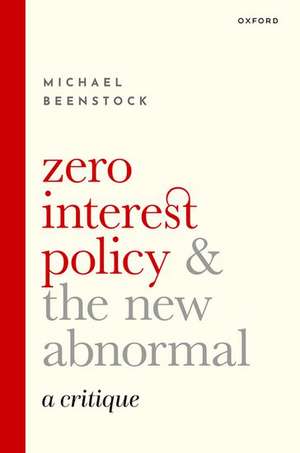Zero Interest Policy and the New Abnormal: A Critique
Autor Michael Beenstocken Limba Engleză Hardback – 2 aug 2022
Preț: 616.86 lei
Preț vechi: 699.73 lei
-12% Nou
Puncte Express: 925
Preț estimativ în valută:
118.04€ • 123.49$ • 98.05£
118.04€ • 123.49$ • 98.05£
Carte disponibilă
Livrare economică 01-07 martie
Preluare comenzi: 021 569.72.76
Specificații
ISBN-13: 9780192849663
ISBN-10: 0192849662
Pagini: 388
Dimensiuni: 165 x 240 x 250 mm
Greutate: 0.73 kg
Editura: OUP OXFORD
Colecția OUP Oxford
Locul publicării:Oxford, United Kingdom
ISBN-10: 0192849662
Pagini: 388
Dimensiuni: 165 x 240 x 250 mm
Greutate: 0.73 kg
Editura: OUP OXFORD
Colecția OUP Oxford
Locul publicării:Oxford, United Kingdom
Recenzii
Beenstock raises a clarion call that should be heard by macroeconomists and policy makers around the world. In quick succession the global financial and pandemic crises have led central bankers to make zero interest rate policies the new normal ... governments have been emboldened by low interest rates to run unprecedented deficits and allow debt to output ratios to reach historic highs. Beenstock brings us back to traditional macroeconomic understanding of the natural rate of interest to show us why permanent zero interest rate policies are unsustainable. He argues that crisis responses have done more to increase risk and inhibit capital formation than to promote investment with reduced cost of finance ...Beenstock shows that there is path back to normalcy and urges policy makers to get started along it. They would benefit from a careful reading of this reminder of the importance of macroeconomics fundamentals.
This is a thought-provoking book.
This is a thought-provoking book.
Notă biografică
Michael Beenstock studied at the London School of Economics from which he obtained his Phd degree in open economy macroeconomics in 1976. After working at H.M. Treasury and the World Bank he joined the faculty of the London Business School and then the Cass Business School (City University, London). In 1987 he emigrated to Israel where he was appointed Professor of Economics at the Hebrew University of Jerusalem.He currently teaches time series and network econometrics to graduate students. He has published eleven books including Neoclassical Theory of Macroeconomic Policy (Cambridge University Press, 1980), Heredity, Family and Inequality (MIT Press, 2012) and The Econometric Analysis of Nonstationary Spatial Panel Data (Springer, 2019 with D. Felsenstein). He has also published over 150 refereed journal articles including on such topics as psychology, climate science and epidemiology.
